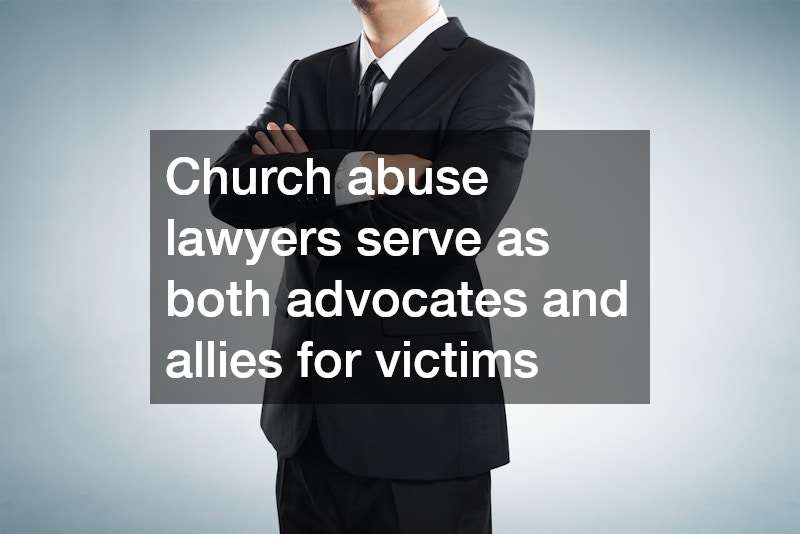Church abuse lawyers play a pivotal role in assisting victims of church-related abuse, providing both legal expertise and emotional support. These cases often involve intricate legal and emotional nuances that require sensitive handling and a deep understanding of the law. By advocating for the rights of victims, church abuse lawyers strive to hold religious institutions accountable and foster safer environments within communities.
What are the Steps Involved in Filing a Lawsuit Against the Church?
Understanding the Legal Framework
The first step in filing a lawsuit against the church involves understanding the specific legal framework applicable to such cases. Victims must be aware of the statutes of limitations, which dictate the time frame within which they can file a claim.
Additionally, identifying the appropriate type of claim, such as negligence or breach of fiduciary duty, is crucial in structuring a strong legal case.
Church abuse cases often require a nuanced understanding of both civil and criminal law. Legal experts help victims navigate these complexities, ensuring their rights are upheld throughout the process. Attorneys also examine potential hurdles, such as jurisdictional issues, that could impact the progression of a lawsuit.
Victims must understand their legal avenues, which include not only lawsuits but also alternative dispute resolutions. It is essential for lawyers to evaluate the merit of each case to develop a viable legal strategy. Clarifying these intricacies reassures victims during what can be a daunting and overwhelming legal journey.
Gathering Evidence and Documentation
Gathering evidence is a critical aspect of building a sound case in church abuse lawsuits. Comprehensive documentation, including medical records, correspondence, and personal testimonies, can significantly strengthen a victim’s case. Attorneys often work with experienced investigators to collect and preserve evidence effectively.
Witness testimonies, whether from other victims or knowledgeable insiders, are vital in corroborating the victim’s account. Expert witnesses may also provide insights into the psychological impact of the abuse, offering a more robust evidential base. Establishing a solid evidentiary foundation is essential in proving the occurrence and impact of the abuse.
The credibility of evidence can make or break a case, making its collection a priority early in the process. Lawyers advise victims on compiling comprehensive records and memories that support their claims. This meticulous approach is crucial, as factual discrepancies can be exploited by defense attorneys, potentially undermining the case.
Initiating Legal Proceedings
Initiating legal proceedings involves a series of structured steps, beginning with filing the initial complaint. The complaint must detail the allegations and the reliefs sought, setting the formal process in motion. Once filed, the complaint is served to the defendants, which typically include the church and its representatives.
This process is often daunting for victims, who must confront their abusers in a legal setting. Church abuse attorneys provide guidance and reassurance, explaining each step in detail to demystify the process. Their expertise ensures procedural accuracy, avoiding delays and errors that could jeopardize the case’s outcome.
How Do Church Abuse Lawyers Support Victims Emotionally and Legally?
Providing Compassionate Support
Beyond legal counsel, church abuse lawyers offer indispensable emotional support to victims throughout the legal process. Recognizing the trauma associated with church-related abuse, lawyers prioritize empathy and understanding in their interactions. Compassionate communication helps victims feel supported and less isolated in their fight for justice.
Experienced attorneys often collaborate with psychologists and counselors to provide holistic support. This integration of legal and emotional care fosters a supportive environment where victims feel empowered to share their stories. These professionals are trained to handle sensitive issues, ensuring victims do not relive their trauma unnecessarily.
Victims’ emotional well-being is paramount, as mental health challenges can arise during legal proceedings. Lawyers facilitate access to resources that address these needs, reinforcing the importance of victim-centered advocacy. Through continuous support, victims maintain the strength needed to persevere through potentially arduous legal battles.
Building a Strong Legal Case
Church abuse lawyers employ strategic measures to build compelling cases for their clients. A thorough analysis of all available evidence is essential to formulating effective legal arguments. Collaboration with expert witnesses provides additional support, painting a comprehensive picture of the abuse’s impact.
Attorneys develop negotiation tactics to achieve favorable outcomes, whether through settlement or trial. Their negotiation skills can lead to settlements that spare victims from the emotional toll of a court trial. However, they also meticulously prepare for trial, crafting arguments and preparing witnesses to ensure readiness for court proceedings.
A strong legal case is not solely reliant on factual evidence; attorneys also consider legal precedents and persuasive narratives to bolster victims’ claims. This multifaceted approach aims to present the most compelling case possible. By using a combination of evidence, expert testimonials, and legal acumen, church abuse lawyers increase the likelihood of a successful resolution.
Church abuse lawyers serve as both advocates and allies for victims, providing essential legal and emotional support. Through their dedicated efforts, they help victims navigate complex legal landscapes while offering empathy and understanding. By holding church institutions accountable, these legal professionals contribute to fostering safer and more transparent environments, ultimately benefitting society as a whole.
.

